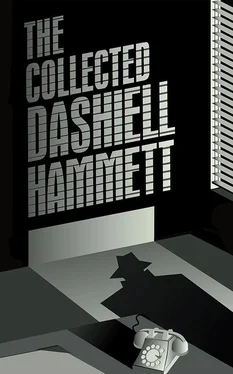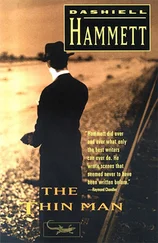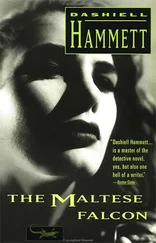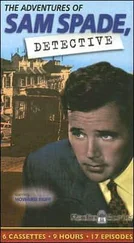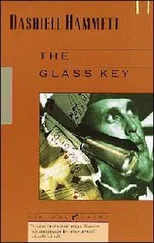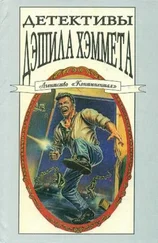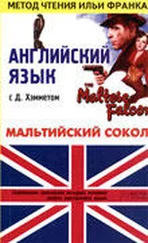“Yes, say fifty.”
The man in gray took five new ten-dollar bills from a pigskin billfold and put them on the desk. With a thick pen Alec Rush began to make muddy ink-marks on a receipt blank.
“Your name?” he asked.
“I would rather not. I’m not to appear in it, you know. My name would not be of importance, would it?”
Alec Rush put down his pen and frowned at his client.
“Now! Now!” he grumbled good-naturedly. “How am I going to do business with a man like you?”
The man in gray was sorry, even apologetic, but he was stubborn in his reticence. He would not give his name. Alec Rush growled and complained, but pocketed the five ten-dollar bills.
“It’s in your favor, maybe,” the detective admitted as he surrendered, “though it ain’t to your credit. But if you were off-color I guess you’d have sense enough to fake a name. Now this young woman — who is she?”
“Mrs. Hubert Landow.”
“Well, well, we’ve got a name at last! And where does Mrs. Landow live?”
“On Charles-Street Avenue,” the man in gray said, and gave a number.
“Her description?”
“She is twenty-two or — three years old, rather tall, slender in an athletic way, with auburn hair, blue eyes, and very white skin.”
“And her husband? You know him?”
“I have seen him. He is about my age — thirty — but larger than I, a tall, broad-shouldered man of the clean-cut blond type.”
“And your mystery man? What does he look like?”
“He’s quite young, not more than twenty-two at the most, and not very large — medium size, perhaps, or a little under. He’s very dark, with high cheek-bones and a large nose. High, straight shoulders, too, but not broad. He walks with small, almost mincing, steps.”
“Clothes?”
“He was wearing a brown suit and a tan cap when I saw him on Fayette Street yesterday afternoon. I suppose he wore the same last night, but I’m not positive.”
“I suppose you’ll drop in here for my reports,” the detective wound up, “since I won’t know where to send them to you?”
“Yes.” The man in gray stood up and held out his hand. “I’m very grateful to you for undertaking this, Mr. Rush.”
Alec Rush said that was all right. They shook hands, and the man in gray went out.
The ugly man waited until his client had had time to turn off into the corridor that led to the elevators. Then the detective said, “Now, Mr. Man!” got up from his chair, took his hat from the clothes-tree in the corner, locked his office door behind him, and ran down the back stairs.
He ran with the deceptive heavy agility of a bear. There was something bearlike, too, in the looseness with which his blue suit hung on his stout body, and in the set of his heavy shoulders — sloping, limber-jointed shoulders whose droop concealed much of their bulk.
He gained the ground floor in time to see the gray back of his client issuing into the street. In his wake Alec Rush sauntered. Two blocks, a turn to the left, another block, and a turn to the right. The man in gray went into the office of a trust company that occupied the ground floor of a large office building.
The rest was the mere turning of a hand. Half a dollar to a porter: the man in gray was Ralph Millar, assistant cashier.
Darkness was settling in Charles-Street Avenue when Alec Rush, in a modest black coupé, drove past the address Ralph Millar had given him. The house was large in the dusk, spaced from its fellows as from the paving by moderate expanses of fenced lawn.
Alec Rush drove on, turned to the left at the first crossing, again to the left at the next, and at the next. For half an hour he guided his car along a many-angled turning and returning route until, when finally he stopped beside the curb at some distance from, but within sight of, the Landow house, he had driven through every piece of thoroughfare in the vicinity of that house.
He had not seen Millar’s dark, high-shouldered young man.
Lights burned brightly in Charles-Street Avenue, and the night traffic began to purr southward into the city. Alec Rush’s heavy body slumped against the wheel of his coupé while he filled its interior with pungent fog from a black cigar, and held patient, bloodshot eyes on what he could see of the Landow residence.
Three-quarters of an hour passed, and there was motion in the house. A limousine left the garage in the rear for the front door. A man and a woman, faintly distinguishable at that distance, left the house for the limousine. The limousine moved out into the cityward current. The third car behind it was Alec Rush’s modest coupé.
Except for a perilous moment at North Avenue, when the interfering cross-stream of traffic threatened to separate him from his quarry, Alec Rush followed the limousine without difficulty. In front of a Howard Street theater it discharged its freight: a youngish man and a young woman, both tall, evening-clad, and assuringly in agreement with the descriptions the detective had got from his client.
The Landows went into the already dark theater while Alec Rush was buying his ticket. In the light of the first intermission he discovered them again. Leaving his seat for the rear of the auditorium, he found an angle from which he could study them for the remaining five minutes of illumination.
Hubert Landow’s head was rather small for his stature, and the blond hair with which it was covered threatened each moment to escape from its imposed smoothness into crisp curls. His face, healthily ruddy, was handsome in a muscular, very masculine way, not indicative of any great mental nimbleness. His wife had that beauty which needs no cataloguing. However, her hair was auburn, her eyes blue, her skin white, and she looked a year or two older than the maximum twenty-three Millar had allowed her.
While the intermission lasted Hubert Landow talked to his wife eagerly, and his bright eyes were the eyes of a lover. Alec Rush could not see Mrs. Landow’s eyes. He saw her replying now and again to her husband’s words. Her profile showed no answering eagerness. She did not show she was bored.
Midway through the last act, Alec Rush left the theater to maneuver his coupé into a handy position from which to cover the Landows’ departure. But their limousine did not pick them up when they left the theater. They turned down Howard Street afoot, going to a rather garish second-class restaurant, where an abbreviated orchestra succeeded by main strength in concealing its smallness from the ear.
His coupé conveniently parked, Alec Rush found a table from which he could watch his subjects without being himself noticeable. Husband still wooed wife with incessant, eager talking. Wife was listless, polite, unkindled. Neither more than touched the food before them. They danced once, the woman’s face as little touched by immediate interest as when she listened to her husband’s words. A beautiful face, but empty.
The minute hand of Alec Rush’s nickel-plated watch had scarcely begun its last climb of the day from where VI is inferred to XII when the Landows left the restaurant. The limousine — against its side a young Norfolk-jacketed Negro smoking — was two doors away. It bore them back to their house. The detective having seen them into the house, having seen the limousine into the garage, drove his coupé again around and around through the neighboring thoroughfares. And saw nothing of Millar’s dark young man.
Then Alec Rush went home and to bed.
At eight o’clock the next morning ugly man and modest coupé were stationary in Charles-Street Avenue again. Male Charles-Street Avenue went with the sun on its left toward its offices. As the morning aged and the shadows grew shorter and thicker, so, generally, did the individuals who composed this morning procession. Eight o’clock was frequently young and slender and brisk, Eight-thirty less so, Nine still less, and rear-guard Ten o’clock was preponderantly neither young nor slender, and more often sluggish than brisk.
Читать дальше
